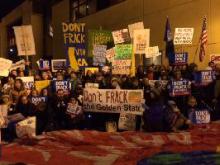
The Director of the California Sierra Club sent this letter to Sierra Club California members on August 20, 2014 about fracking. For more information about the efforts to ban fracking in San Benito County that she references, visit ProtectSanBenito.org.
Dear Sierra Club California Members and Friends,
CA State Capitol Legislators are now winding up the last two weeks of a two-year session, and senators and assembly members will vote on a collection of bills that will help improve or protect California’s environment.
For instance, they’ll vote on bills that will move California out of the water policy dark ages and begin to regulate groundwater (AB 1739 and SB 1168, which Sierra Club California supports). They’ll vote on whether to ban plastic grocery bags statewide, just as many local communities have already done (SB 270, which we support); whether to give consumers information about flame retardants in furniture (SB 1019, which we support); whether to maintain public access to beaches (SB 968, which we support); and how to direct incentives to expand access to clean zero-emission and near-zero-emission passenger and freight vehicles (SB 1275 and SB 1204, which we support).
All of this is important, and Club activists and staff and our allies are working here to make sure the environment gets a fair shake.
But my mind keeps turning to outside the Capitol. Some of the most interesting environmental policy action that can make a difference for how much water is available for drinking, and how clean the air is, and whether the state will be at risk of new earthquakes, isn’t occurring in the state legislature. It’s occurring in counties and cities around California.
From Los Angeles to Culver City, from San Benito County to Butte County, from Santa Barbara to Mendocino, residents have taken a line from the 1976 movie “Network.” They have watched as the oil industry in California has expanded its use of extreme oil extraction methods, including fracking, and they are saying, as the movie’s anchorman Howard Beale urged his viewers to do, “I’m mad as hell and I’m not going to take it anymore.”
This week, the Los Angeles Times wrote about one of those local efforts in Santa Barbara County. Earlier this year, a group of residents formed a grassroots network that crafted an initiative to ban extreme oil extraction in their county. Within a handful of weeks, they collected the roughly 16,000 signatures needed to qualify Measure P for the local ballot.
Now the campaign has begun.
Few industries have more money than the oil industry, and few spend it as liberally to influence voters and elected officials. So it is no surprise that oil companies, from Freeport McMoRan to Chevron, have already poured a few million into defeating local efforts to halt fracking.
The Yes on Measure P campaign and the groups backing it also have begun raising money. It requires a lot to pay for the mailers and media to get the word out and then to get voters to the polls.
Yet, even though they’ll never raise as much money as the measure’s oil industry opponents can spend, the Measure P campaign proponents remain optimistic. Why?
The measure will be voted on by the public.
It will be voted on by people who actually have to breathe the air that gets more polluted with each new installation of a fracking well. These are the people who will have to compete with fracking for access to water in a parched region in a drought-plagued state. These are people who will have to live with the effects of accelerated climate change—from sea-level rise to more vector-borne disease—which will be one of the results of a new wave of extreme extraction methods.
The public has shown, time and again, that money isn’t the only deciding factor in ballot measure campaigns. Much of the time people vote a certain way simply because it’s the right thing to do.
Halting fracking is the right thing to do in California. I’m putting my money on people power this year.
Sincerely,
Kathryn Phillips
Director
Click here to see the original letter.